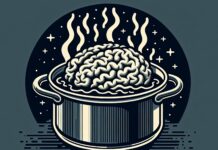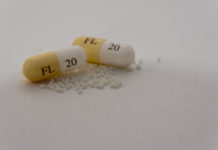A crime that shocked a nation:
In sleepy Raurimu, a tiny settlement in New Zealand’s central North Island, the Saturday morning peace was shattered on the 8th of February, 1997 when a young man from Wellington turned a shotgun onto a group of people staying at his family’s ski and hunting lodge. Six people died that morning and another four were seriously wounded.
Twenty-four years old at the time, Stephen Anderson was arrested, naked in farmland not far from the scene at Raurimu, and later charged with six murders and four attempted murders. At a High Court trial in December 1997, he was found not guilty of the charges by reason of insanity and court ordered to undergo forensic mental health treatment as one of his country’s most high-profile ‘special patients.’

I am Steve Anderson. Much was written and said about my actions on that day, but the stories lacked context and were typically sensationalized or simply focused blame on the wrong things. I would like to offer a firsthand account with my own views of what went wrong. I hope that some valuable learning can come from me filling in the blanks and putting a human face to this life-changing and highly traumatic experience.
I have been receiving treatment with psychiatric drugs here in New Zealand since around April 1995. I have spent over two decades receiving forensic mental health treatment since the Raurimu tragedy of February 1997, much of it inpatient.
Believe it or not, I consider myself a reasonably average New Zealander. I like classic motorcars and the great outdoors, and I grew up making the most of New Zealand’s spectacular natural environment. As a family we had trips overseas, and later I worked in the Camp America program, turning 19 years old in the process.
My initial contact with psychiatrists followed me being unhappy about the treatment I received at the hands of Wellington police after an arrest for disorderly behavior. It is fair to say that there had been some cracks forming in my mental health in the years preceding this event. I had been ‘down’ for some time, to the point of feeling at times that I did not want to be around. I was self-medicating with cannabis and socially used alcohol and occasionally some other street drugs.
My behavior got out of hand after my first work Christmas party. This occurred in December 1994. After drinking too much, and then getting into an altercation on the street, I was arrested and taken to Wellington Central police station where I was beaten while in police custody.
I am 51 now, and I have tried to put what is in the past behind me. An important point to mention early on is that I experienced my first taste of a psychotic episode after I started and then stopped taking psychiatric drugs. When these thoughts reached a crisis point in my mind, I was arrested while in this altered state of reality, assessed, and admitted to Pineview, an acute unit at Porirua Hospital in August 1995 following a car chase with local police. I had stopped taking my antipsychotic pills almost cold turkey some months earlier because I deemed certain side effects too difficult to manage alongside my work obligations. I had stopped taking Stelazine and had recently started and then stopped taking a one-month script for Aropax (an SSRI) that July just past.
A disturbing pattern of psychotic experiences and hospital admissions following the stopping of antipsychotic medications or the starting of SSRI drugs has been forming over the decades of my treatment with psychiatric drugs ever since.
My current treatment team does not openly acknowledge the pattern as anything significant other than, “If you don’t take your meds, you’ll get unwell.”
In the community, without my consent, I am currently being treated with IMI (intramuscular injection) medication to assure my compliance with treatment. I have always felt overmedicated. I seem to be sensitive to antipsychotics, and during treatment I have been at my best when taking only very modest doses of these medications. But as soon as I take nothing at all, a few months later I start to become psychotic.
The worst thing that occurred while off medication took place in February 1997 when I shot dead my father and five of his friends, seriously wounding another four, at Raurimu, a small township in New Zealand’s central North Island. I was floridly psychotic at the time. The story made international headlines. This was my second experience of a psychotic break, and I was most probably experiencing another withdrawal psychosis from the antipsychotic medication I had been prescribed but was no longer taking.
To give this story some more context, at the start of 1995 I had been working as a dental technician in a busy crown and bridge dental laboratory in Wellington city, after completing a diploma in dental technology at the close of 1994. I had been a student at the Central Institute of Technology between 1992 and 1994. I had been down in mood for a significant period of my study years.
At the start of 1995, likely traumatized and suffering the after-effects of a blow to the head compliments of police, I went to see my family doctor. I told him what I could recall of what happened to me in the police station. This doctor had been my family general practitioner since I was an infant. I became tearful while relating the story during the consultation and my doctor said he considered me to be ‘depressed.’ I was 22 at the time, and with my consent, private appointments were arranged for me with a local psychiatrist who had a good reputation for working with children and young people.
I do not think the psychiatrist believed my story about being assaulted by police at the station in December 1994. In talking to him, I thought he would back me up and give me a clean bill of mental health. Years later, I learned the psychiatrist had allegedly blamed my experience on the cannabis I was perhaps overly fond of using at the time. A recurring theme, it would seem, over the years of treatment since. In 1995 I was discouraged from using cannabis and started on antidepressant and antipsychotic medication almost immediately upon beginning consultations with the psychiatrist.
I have since learned that CBD (cannabidiol, a non-psychoactive cannabinoid found in the cannabis plant) may have uses beyond what we could have hoped for in a drug, where not only is it antiviral, but it relieves anxiety, is likely neuroprotective, and has antipsychotic properties amongst a range of other medical applications. People require relief from their human sufferings, and the cannabis plant and its derivatives seem to have an important contribution to make to that end. In New Zealand, it has only been in the last few years that CBD oil and other products have been available to the patients who might benefit from their use. But such medications are not funded by the state and people must source private treatment.
Back in 1995, on the pharmaceutical drugs, I deteriorated. I became increasingly obsessed with winning my complaint against the police, about what had happened in December 1994 in their station. I hired a lawyer to help me with the complaint process, later involving the Police Complaints Authority as it was known at the time, and I spent a lot of effort and energy writing down all I could recall.
I was living at my family home in Khandallah, Wellington. I started helping myself to alcohol on occasion. Drinking for the effect while writing at the computer and ruminating. I was struggling with motivation to get up in the morning and had problems at work like blurred vision as side effects of treatment with the pills.
I did not get anywhere with the police complaint. I received a letter from the PCA stating that my assault complaint against police “could not be established.”
After stopping the antipsychotics, I ended up in Pineview Acute Unit, Porirua Hospital, in August 1995, six months after seeing a psychiatrist, and eight months after my arrest for disorderly behavior. I was likely still traumatized by my encounter with police the previous December.
Wellington is a small place. In 1995 I was getting stopped by uniformed police regularly while out in my car, and my firearm’s license was quickly revoked by a team of the same officers I had complaints against. Things very close to home started turning up in police-themed media, and this pricked my guilty conscience about certain sensitivities in my past.
During my August 1995 involuntary hospital admission to Pineview, I was diagnosed with paranoid schizophrenia and again prescribed antipsychotic pills by the public health system doctors. In the hospital records I was said to have ‘systematized and persecutory delusions.’
After my 1995 admission to hospital, I was trying to make sense of what had happened to me. My psychosis had a strong spiritual aspect to it. At the time I felt like some kind of prophet or modern-day messiah, and this is a common theme for people in a psychotic state when admitted to a psychiatric hospital. I was trapped in a dystopian nightmare and I wanted to wake people up to what I believed was really going on. Everyday people appeared brainwashed and oppressed by the system and it was my existential obligation to free them from the media’s grip on their minds. I had been restrained while in hospital and treated with IMI drugs. In the community, I took the meds as charted for a while and then used them sporadically up until ceasing compliance with treatment almost completely sometime around October 1996. By the 8th of February 1997 I was floridly psychotic for the second time, and tragically, I acted on that distorted view of reality and committed a serious offense, killing those innocent people at our family’s ski and hunting lodge at Raurimu.
The Raurimu tragedy affected real people and their friends and families. Understandably, there was a lot of anger directed at me and my surviving mother, Helen. A coroner’s inquest essentially blamed my father, Neville, for not securing his firearms and ammunition effectively, and my care from mental health services was criticized. I wake to what has happened every day, and these days I must filter my every action through the memories and the fallout of what I did when I was psychotic as a twenty-four-year-old kid.
Over the years my diagnosis was changed to schizoid affective disorder, and at one time delusional disorder was suggested. With the passing of time and through learning new information, I have changed my mind about a few things too.
My doctors say my illness is characterized by delusions. At my Hamilton High Court multiple murder trial in December 1997, I was found ‘not guilty by reason of insanity’ of all charges, and the diagnosis of paranoid schizophrenia became stuck fast even though I do not hear voices or experience any other psychiatric symptoms. New Zealanders were outraged that this tragedy had happened in our small and friendly nation, but no one has said anything about the effects of taking and stopping medication, then or since.
I spent years in hospital ‘recovering’ while receiving forensic mental health care. I took many medications and met many interesting people on both sides of the ledger, and I suspect I am not the only person to experience life-changing outcomes after trying to stop my treatment, never warned and ignorant of the fact that it could lead to psychosis. This country has seen several crimes and trials where the perpetrator has been taking, or had changes made to, or recently come off psychiatric medications.
Currently, I live independently in the community and give care to my aging mum. I have written a book about my experience of all this. It is a unique story because usually, someone experiencing what I have dies during the process, and my book is a firsthand account, with a before and then the aftermath to my story.
I do not hold much hope of the Raurimu tragedy being seen by the world of psychiatry in the context I have just outlined — that is, as the consequence of stopping my medications and experiencing a withdrawal psychosis. My personal cannabis use was blamed for my offending in equal proportion with my ‘paranoid schizophrenia.’ Neither of which I accept as an adequate explanation for what I have done, while in an altered state of reality, and then ‘been through’ to make a functional recovery.
Many mental health professionals in New Zealand seem trapped in a paradigm of thinking from another time concerning cannabis and other drugs. I have consistently been labeled ‘pro-cannabis’ but really, I feel I am just anti-prohibition policy. Prohibition is a severe policy to deal with the cannabis-using community. The prohibition mentality seems unable to accept that the cannabis plant has any redeeming qualities. There is a difference between being pro-cannabis and giving the cannabis plant its long-established dues.
The things that assisted greatly with helping me recover were the basics like learning some meditation and mindfulness skills and practicing them. People who made a difference during my treatment were those who saw me and treated me as a person first, rather than some cluster of serious risks and objectionable symptoms.
These days I try to maintain my inner peace using some important techniques and skills taught to me by others as I have made my recovery. If I am angry, I try to apply the opponent mind of patience to my anger these days.
What happened has taught me a valuable lesson in humility. I am doing my best to live a peaceful, happy life in the community, but I feel my full recovery is still on hold. Trying to get off compulsory treatment with IMI medication in New Zealand presents its challenges, as the current medical mindset is rather ‘risk averse.’ Psychiatrists seem adept at initiating people to pills, syrups and injections, but do not appear very skilled at helping their patients come off them again when they are no longer required.















This is a courageous account. Thank you.
Report comment
Thanks. I hope people get something out of it.
Report comment
Psychiatry is a quacking duck. They do NOT have actual facts to support forced medication.
The author should seek a lawsuit against the psychiatric establishment as obviously they failed him in his time of need, leading directly to psychosis and the subsequent deaths of people he was in contact with.
Report comment
Steve, thank you for sharing your perspective. I’m so sorry for your tragic experience. I believe you completely. I agree with your insights. My 22 year old son’s experience includes the horrors you describe of being treated only to end up in rebound psychosis.
I am convinced, as you say, most of these horrible sprees are the result of withdrawal from antipsychotic or antidepressant medications. I believe that the Dr’s are Delusional because their existence and paychecks depend on them believing the lie that there is nothing else that can be done for an upset agitated young man, except to give Haldol.
But, I am especially intrigued that you were a dental professional. My son’s perceptual problems followed physical changes to his head, face, neck and body after wearing plastic orthodontic Aligners that were covertly designed to mangle and collapse his dental arch. Its a long and horrifying story. We have learned that the loss of just a milimeter of width or length in your dental arch can result in the loss of nasal breathing, leading to insomnia and activation of your fight / flight system. I’m wondering if you had braces, had teeth removed, or had Invisalign in the year or two prior to the onset of symptoms?
Report comment
Hi Susan
Thanks for taking the time to reply and share your experience.
I cannot say I have heard of dental problems causing psychosis, but sleep apnea is a big problem for some. It can remain undiagnosed or untreated which causes the person’s days to be ruined through lack of proper sleep.
The lower jaw, the mandible, can be articulated forward so it is protruding, and this position increases airflow down the airway and into the lungs. A CPAP sleeping aid machine might not be necessary if the mandible can be oriented forward during sleep with the help of a dental appliance worn by the person at night.
I have sleep apnea from being overweight, and perhaps being on sedative meds doesn’t help my breathing either…
I don’t know how many problems of a criminal nature have been caused by meds, but in my experience in hospital I have met others with similar stories to mine.
Haldol is a very serious medication. It has been used as a torture devise in Russian hospitals for political dissidents, and US authorities have dosed people up on it before they render them to other countries for interrogation.
I have previously been treated with IMI haloperidol meds. Nasty stuff.
I hope you can find some answers to your questions.
Report comment
My comment is for Susan , I have a close family member who experienced something similar like you are talking about, I would like to tell you about it
Mike
Report comment
I have a story for you, a close family member of mine, I googled his situation and the only thing related that. And up was this comment by you. Message me back and we can talk privately if possible
Mike
Report comment
“I had stopped taking Stelazine and had recently started and then stopped taking a one-month script for Aropax (an SSRI) that July just past.”
I don’t have a good knowledge of these psychiatric drugs so thought i’d google the Aropax. I thought it might be one of the benzos given the ‘pax’ suffix but ……..
“AROPAX corrects the chemical imbalance and so helps relieve the symptoms of major
depressive disorder.
AROPAX may also be used to treat irrational fears, general anxiety and
obsessive behaviour. These can also be due to chemical imbalances in parts
of the brain.”
from;
https://www.medsafe.govt.nz/consumers/cmi/a/aropax.pdf
I’d be hanging on to a copy of that document if I were you Steve. I do hope that the day will come when these lies which have been told by the psychiatric establishment, big Pharma, and governments are recognised by the Courts. These types of documents seem to be disappearing, and history being “edited”.
Not sure I agree with you about the pot (particularly when taken in conjunction with alcohol). But I lost brothers and sisters in an event in Christchurch on the 15th of March 2019, and so would be expected to take that stance.
“I am doing my best to live a peaceful, happy life”
It gets easier with practice i’ve found. Take care
Report comment
Thanks for your comments boans.
Psychiatrists perhaps like certain drugs too much because prescribing them makes the doctor appear like a regular health professional.
Bias on both sides can muddy the waters of the cannabis debate. Good thing CBD is not THC, but I feel the risks of cannabis use have been overstated over the years.
Report comment
Bro, you are lucky you don’t live in the United States. Over here, we go nuclear on NGRI defendants. The only one I can think of who returned to a peaceful life is John Hinckley, Jr. . And, his family was rich and politically connected. Seriously, NO ONE should be prosecuted for NGRI, if psychiatry abused or experimented on them. At most, they should be convicted of involuntary manslaughter and sentenced the same as an abled defendant. I’m glad you’re free(ish) again and I hope someday you’re released from court-ordered medication.
Report comment
Hi J
Thanks for reading my story, and for posting a comment. We’ll have to see about the meds situation.
Report comment
“A disturbing pattern of psychotic experiences and hospital admissions following the stopping of antipsychotic medications or the starting of SSRI drugs has been forming over the decades of my treatment with psychiatric drugs ever since.
My current treatment team does not openly acknowledge the pattern as anything significant other than, “If you don’t take your meds, you’ll get unwell.”….”….from the article above….
Steve, first, please stop using the false, fraudulent and deceptive euphemisms of “meds”, and “medications”. DRUGS are DRUGS are DRUGS are DRUGS, NOT “meds”….
There is NO “medical” anything that is being “treated” with psych drugs…. There is NO “chemical imbalance” in your brain that is being “re-balanced” by the psych drugs. Neither reality nor physiology works that way. Chemistry, neither!….
What happened to you is better described as a “toxic withdrawal psychosis”…..
Both your story, above, and my comment here, are far too short to really do this topic justice….but it’s a start….
Welcome to MadinAmerica!….
*what I didn’t realize until too late, was that the psych drugs THEMSELVES made me violent, crazy and dangerous….
You became so “UNWELL” in the first place, BECAUSE OF the psych drugs!….
But all those “clinicians” will NEVER admit that truth!….too bad….
And “boans”, who commented above, is 100% correct. Check out both of our comment histories here, for more insights & info….
Report comment
Hi Bill
Controlling the language of the debate very easily tips the balance in the system’s favor. It has been used to good effect in the case of psychiatry.
It is a shame drugs are the first line of response in the treatment approach. In NZ we also have high rates of inpatient compulsory treatment and seclusion in the hospital setting.
Report comment
Well written, Steve. The institution of psychiatry are to blame for not only this situation but countless others. Thanks so much for offering your experience to help others.
Report comment
Hi Lynda
Thanks. I wish it didn’t have to go like this but raising awareness when you are deemed mentally ill is not so easy…
New Zealand seems a long way behind what science says about all this. It just rolls over year to year.
I certainly had problems but the outcome of psychosis from drug withdrawal is the one thing that has changed my life more than any other and affected many people around me.
Thanks for your comments.
Report comment
My initial first paragraph “thought” due to linguistics was ……. Spoilt (without knowing You (Steve Anderson) an emotional thought of sadness due to your (Steve Anderson) feeling the Psychiatrist did not believe you.
Sounds like a horrible incident for you your family also the family’s involved I am sure that you are a kind person, there is good in everybody it depends on the beholder that chooses to see that.
Report comment
Thanks for your compassionate message.
Steve
Report comment